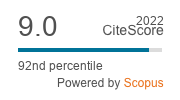Allergic asthma is a chronic disease mainly characterised by eosinophil inflammation and airway remodelling. Many studies have shown that the gut microbiota of allergic individuals differs from that of non-allergic individuals. Although high levels of bifidobacteria have been associated with healthy persons, Bifidobacterium adolescentis ATCC 15703, a gut bacteria, has been associated with allergic individuals in some clinical studies. The relationship between B. adolescentis ATCC 15703 and asthma or allergies has not been well elucidated, and its effect may be dependent on the host’s genetic profile or disease state. To elucidate this question, we evaluated the role of preventive B. adolescentis ATCC 15703 treatment on experimental allergic airway inflammation in two genetically different mouse strains, Balb/c and C57BL/6 (B6). Balb/c mice display a greater predisposition to develop allergic responses than B6 mice. Oral preventive treatment with B. adolescentis ATCC 15703 modulated experimental allergic airway inflammation, specifically in Balb/c mice, which showed decreased levels of eosinophils in the airway. B6 mice did not exhibit any significant alterations in eosinophils but showed an increased influx of total leukocytes and neutrophils into the airway. The mechanism underlying the beneficial effects of these bacteria in experimental allergic mice may involve products of bacteria metabolism, as dead bacteria did not mimic the ability of live B. adolescentis ATCC 15703 to attenuate the influx of eosinophils into the airway. To conclude, preventive oral B. adolescentis ATCC 15703 treatment can attenuate the major characteristic of allergic asthma, eosinophil airway influx, in Balb/c but not B6 mice. These results suggest that oral treatment with this specific live bacterial strain may have therapeutic potential for the treatment of allergic airway disease, although its effect is mouse-strain-dependent.
RESEARCH ARTICLE
Prophylactic Bifidobacterium adolescentis ATTCC 15703 supplementation reduces partially allergic airway disease in Balb/c but not in C57BL/6 mice
M.C. Casaro Related information
1Institute of Environmental, Chemistry and Pharmaceutical Sciences, Department of Pharmaceutics Sciences, Federal University of São Paulo, 09972-270 Diadema, SP, Brazil.
2Institute of Biomedical Sciences, University de São Paulo, Department of Physiology and Biophysics, Av. Prof. Lineu Prestes, 1524, 05508-000 São Paulo, SP, Brazil.
, A.R. Crisma Related information2Institute of Biomedical Sciences, University de São Paulo, Department of Physiology and Biophysics, Av. Prof. Lineu Prestes, 1524, 05508-000 São Paulo, SP, Brazil.
2Institute of Biomedical Sciences, University de São Paulo, Department of Physiology and Biophysics, Av. Prof. Lineu Prestes, 1524, 05508-000 São Paulo, SP, Brazil.
, A.T. Vieira Related information3Institute of Biological Sciences, Department of Immunology, Federal University of Minas Gerais, 31270-901 Belo Horizonte, MG, Brazil.
, G.H.M. Silva Related information1Institute of Environmental, Chemistry and Pharmaceutical Sciences, Department of Pharmaceutics Sciences, Federal University of São Paulo, 09972-270 Diadema, SP, Brazil.
2Institute of Biomedical Sciences, University de São Paulo, Department of Physiology and Biophysics, Av. Prof. Lineu Prestes, 1524, 05508-000 São Paulo, SP, Brazil.
, E. Mendes Related information2Institute of Biomedical Sciences, University de São Paulo, Department of Physiology and Biophysics, Av. Prof. Lineu Prestes, 1524, 05508-000 São Paulo, SP, Brazil.
1Institute of Environmental, Chemistry and Pharmaceutical Sciences, Department of Pharmaceutics Sciences, Federal University of São Paulo, 09972-270 Diadema, SP, Brazil.
, W.R. Ribeiro Related information1Institute of Environmental, Chemistry and Pharmaceutical Sciences, Department of Pharmaceutics Sciences, Federal University of São Paulo, 09972-270 Diadema, SP, Brazil.
, F.S. Martins Related information4Institute of Biological Sciences, Department of Microbiology, Federal University of Minas Gerais, Avenida Presidente Antônio Carlos 6627, C.P. 486, Pampulha-Campus, 31270-901, Belo Horizonte, MG, Brazil.
, C.M. Ferreira Related information1Institute of Environmental, Chemistry and Pharmaceutical Sciences, Department of Pharmaceutics Sciences, Federal University of São Paulo, 09972-270 Diadema, SP, Brazil.
*Corresponding author: caroline.
*Corresponding author: caroline.
Beneficial Microbes: 9
(3)- Pages: 465 - 476
Published Online: April 10, 2018
2022 Journal Impact Factor
5.4
source: Journal Impact Factor 2023™ from Clarivate™

Institutional Offers
For institutional orders, please contact [email protected].
-
A.A. Hibberd, C.C. Yde, M.L. Ziegler, A.H. Honoré, M.T. Saarinen, S. Lahtinen, B. Stahl, H.M. Jensen and L.K. Stenman
-
E.E. Blaak, E.E. Canfora, S. Theis, G. Frost, A.K. Groen, G. Mithieux, A. Nauta, K. Scott, B. Stahl, J. van Harsselaar, R. van Tol, E.E. Vaughan and K. Verbeke
-
K. Venema, J. Verhoeven, C. Beckman and D. Keller
-
E. Arvidsson Nordström, C. Teixeira, C. Montelius, B. Jeppsson and N. Larsson
-
J.E. Haarhuis, A. Kardinaal and G.A.M. Kortman
-
E.E. Blaak, E.E. Canfora, S. Theis, G. Frost, A.K. Groen, G. Mithieux, A. Nauta, K. Scott, B. Stahl, J. van Harsselaar, R. van Tol, E.E. Vaughan and K. Verbeke
-
K. Lippert, L. Kedenko, L. Antonielli, I. Kedenko, C. Gemeier, M. Leitner, A. Kautzky-Willer, B. Paulweber and E. Hackl
-
K. Tsilingiri and M. Rescigno
-
M. Ozen and E.C. Dinleyici
-
Y. Kobayashi, T. Kuhara, M. Oki and J.-Z. Xiao



